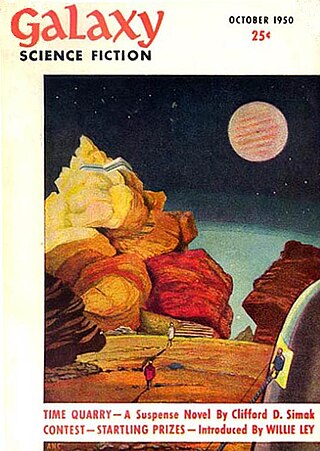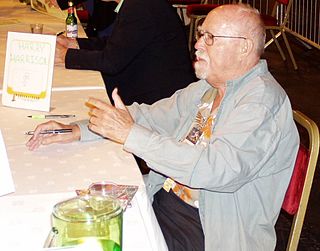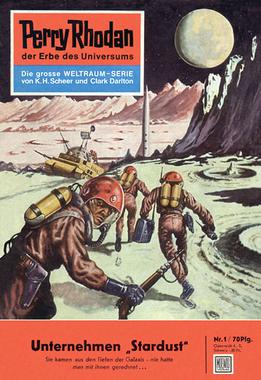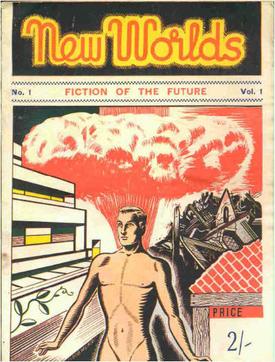
Donald Allen Wollheim was an American science fiction editor, publisher, writer, and fan. As an author, he published under his own name as well as under pseudonyms, including David Grinnell, Martin Pearson, and Darrell G. Raynor.
Terra may often refer to:

Galaxy Science Fiction was an American digest-size science fiction magazine, published in Boston from 1950 to 1980. It was founded by a French-Italian company, World Editions, which was looking to break into the American market. World Editions hired as editor H. L. Gold, who rapidly made Galaxy the leading science fiction magazine of its time, focusing on stories about social issues rather than technology.

Harry Max Harrison was an American science fiction author, known mostly for his character The Stainless Steel Rat and for his novel Make Room! Make Room! (1966). The latter was the rough basis for the motion picture Soylent Green (1973). Long resident in both Ireland and the United Kingdom, Harrison was involved in the foundation of the Irish Science Fiction Association, and was, with Brian Aldiss, co-president of the Birmingham Science Fiction Group.

Perry Rhodan is a West German/German space opera franchise, named after its hero. It commenced in 1961 and has been ongoing for decades, written by an ever-changing team of authors. Having sold approximately two billion copies worldwide, it is the most successful science fiction book series ever written. The first billion of worldwide sales was celebrated in 1986. The series has spun off into comic books, audio dramas, video games and the like. A reboot, Perry Rhodan NEO, was launched in 2011 and began publication in English in April 2021.

Science Fantasy, which also appeared under the titles Impulse and SF Impulse, was a British fantasy and science fiction magazine, launched in 1950 by Nova Publications as a companion to Nova's New Worlds. Walter Gillings was editor for the first two issues, and was then replaced by John Carnell, the editor of New Worlds, as a cost-saving measure. Carnell edited both magazines until Nova went out of business in early 1964. The titles were acquired by Roberts & Vinter, who hired Kyril Bonfiglioli to edit Science Fantasy; Bonfiglioli changed the title to Impulse in early 1966, but the new title led to confusion with the distributors and sales fell, though the magazine remained profitable. The title was changed again to SF Impulse for the last few issues. Science Fantasy ceased publication the following year, when Roberts & Vinter came under financial pressure after their printer went bankrupt.

New Worlds was a British science fiction magazine that began in 1936 as a fanzine called Novae Terrae. John Carnell, who became Novae Terrae's editor in 1939, renamed it New Worlds that year. He was instrumental in turning it into a professional publication in 1946 and was the first editor of the new incarnation. It became the leading UK science fiction magazine; the period to 1960 has been described by science fiction historian Mike Ashley as the magazine's "Golden Age".

Edwin Charles Tubb was a British writer of science fiction, fantasy and western novels. The author of over 140 novels and 230 short stories and novellas, Tubb is best known for The Dumarest Saga, an epic science-fiction saga set in the far future. Michael Moorcock wrote, "His reputation for fast-moving and colourful SF writing is unmatched by anyone in Britain."

Walter Ernsting was a German science fiction and fantasy author who mainly published under the pseudonym Clark Darlton. He grew up in Koblenz and was drafted into the German Wehrmacht shortly after the beginning of World War II. He served in an intelligence unit in Norway and on the Eastern Front, where he was captured and spent several years as a prisoner of war in Siberia.

Jesco Hans Heinrich Max Freiherr von Puttkamer was a German-American aerospace engineer, senior manager at NASA, and a pulp science fiction writer.
Karl-Herbert Scheer was a German science fiction writer, usually credited as K. H. Scheer.

The Eyes of the Overworld is a picaresque fantasy fix-up novel by American writer Jack Vance, published by Ace in 1966, the second book in the Dying Earth series that Vance inaugurated in 1950. Retitled Cugel the Clever in its Vance Integral Edition (2005), the story takes place in Vance's Dying Earth setting, where the Sun is dying and magic and technology coexist. It features the self-proclaimed Cugel the Clever in linked episodic stories. Cugel is an anti-hero character; while he is typically a crafty scoundrel who seeks to turn a profit from a situation, he retains some good values at times. In the novel, Cugel is caught stealing from a wizard, who forces Cugel to travel to a faraway realm to find a rare magical jewel.
Utopia was the name of several science fiction series published by Erich Pabel Verlag, Rastatt. Together with the Terra series of the rival publisher Arthur Moewig Verlag, Munich, the Utopia series were the most important science fiction work in the early years of West Germany.

Far Horizons: All New Tales from the Greatest Worlds of Science Fiction is an anthology of original science fiction stories edited by Robert Silverberg, first published in hardcover by Avon Eos in May 1999, with a book club edition following from Avon and the Science Fiction Book Club in July of the same year. Paperback and trade paperback editions were issued by Eos/HarperCollins in May 2000 and December 2005, respectively, and an ebook edition by HarperCollins e-books in March 2009. The first British edition was issued in hardcover and trade paperback by Orbit/Little Brown in June 1999, with a paperback edition following from Orbit in July 2000. The book has also been translated into Spanish.

Flashing Swords! #3: Warriors and Wizards is an anthology of fantasy stories, edited by American writer Lin Carter. It was first published in paperback by Dell Books in August 1976. The first German edition was issued by Pabel in November 1978.
Hans Joachim Alpers was a German writer and editor of science fiction and fantasy. Together with Werner Fuchs and Ulrich Kiesow he founded Fantasy Productions, which became one of the premier German RPG- and board game producers and retailers. He was born in Bremerhaven.

The Star Conquerors is a science fiction novel by American writer Ben Bova. It was published in 1959 by the John C. Winston Company.

The Angry Espers is a science-fiction novel written by Lloyd Biggle, Jr. and published by Ace Books as half of Ace Double #D-485 in 1961. The novel first appeared in the August 1959 issue of Amazing Science Fiction Stories as A Taste of Fire. In 1962 it was given Honorable Mention as a candidate for the Best Novel Hugo Award.

The World Menders is a science fiction novel written by Lloyd Biggle, Jr. and published in 1971 by Doubleday. In the story Biggle explores the old aphorism about the road to Hell being paved with good intentions and he garnered for himself a nomination for a Locus Best Novel Award.

Fool's Run is a science fiction novel by Patricia A. McKillip. It was first published in hardcover by Warner Books in April 1987, with a paperback edition issued by Questar/Popular Library in February 1988. The first British edition was published in paperback by Orbit in June 1987, with a hardcover edition following from Macdonald in August of the same year. The novel has also been translated into Italian.















